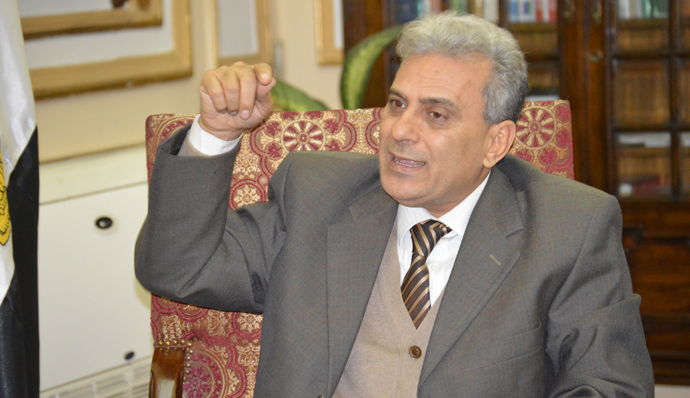Prepared by: Aghareed Mahmoud
Conducted by: Khaled Al-Amin and Mahmoud Ali
Q: Fighting Terrorism with Art and Culture?
Even when we were amid battle against terrorism; we resorted to art, culture, and theatre. Using cultural tools to overcome all barriers and grow trust among students and us, we won them over convincing them that we work toward their interest. We were also targeting all students, whatever their characters or taste were. We had a live theater here under the Dome, where shows were held at different occasions; e.g., “Abo Shaar Brothers” band held a concert at “Mawlid al Nabi” with 50,000 students attending.
Q: Managing Cairo University’s debts and resources?
Cairo University currently has needs that are estimated at EGP200mn, and debts amounted to EGP150mn. We applied administrative and financial reforms, controlled financial awards, adopted transparency, provided access to information on our official website, optimized subsidies, and worked on eliminating sources of financial burden on the University.
Reforming
the administrative, financial, educational, and social systems in Egypt does not necessarily require funding
Q: What were the challenges you encountered while applying such reforms?
Well, any reforming wins the support of people, provided that there is transparency, and justice even in applying controls. We have applied these reforms without being unfair to anyone or stripping privileges from those who deserve them. But, we have definitely stripped them away from the corrupt, whatever positions they held. For 9 years the government allocations to the University were are worth EGP 1400m, enough to cover its expenditures for only 6 months -ending on 31 January each year. As for the rest of the year, it depended on its own resources to cover its needs. While this year, due to these administrative and financial reforms, the government allocations covered the needs of the University for 11 months, resulting in less pressure on our resources, as it maximised spending on the university to EGP 200m, which enabled us to pay debts and dues. Moreover, the year preceding my appointment as president, the University allocated only EGP 23m to scientific researches; but, this year we have allocated EGP 114m, despite challenges we face.
What I mean to say is that reforming the administrative, financial, educational, and social systems in Egypt, does not necessarily require funding. If you ask anyone to reform, he would ask you for money to apply these reforms, and thats a principle we must not accept.
In fact, there are reforms in the education system that have positive effects; for instance, we had 11 colleges here that operate based on the credit-hours system, where students take 2 exams for free -one in January and the other in June. If a student fails, he may have to take a summer course, for EGP 200 per hour for a 4-hour daily course. If a student does not want to take this summer course, he will have to retake the course. This saved the University around35m a year.
Sometimes, people tell me that I am being restrictive about unnecessary things that would not save any money, but even if I save only one pound, it is worth it. For instance, in Ramadan the dean asked that the University host an Iftar, but I refused. We have 24 colleges, so to host an Iftar, it would cost us from EGP 50-150,000 each, according to how big the college is. This alone is about EGP 2m. While, we can afford it through making invitees pay EGP 100 each. Therefore, I must say that restructuring the administrative and financial systems led us, in turn, to restructuring and reforming the educational system.
Photo Credit: Ahmed Saber


